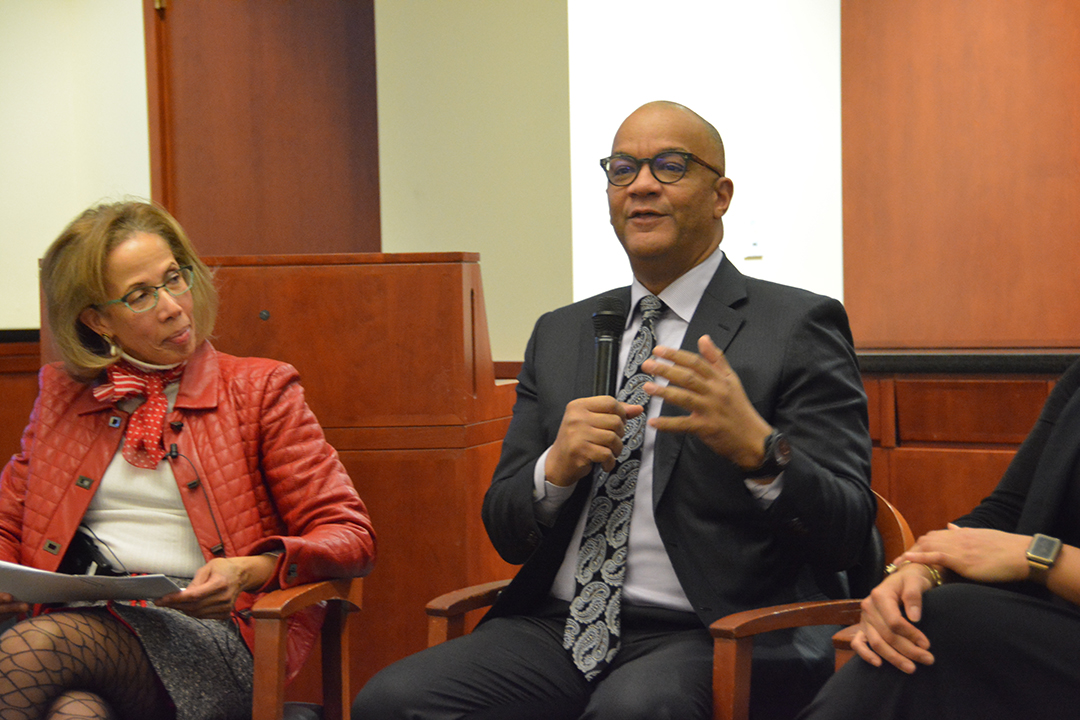While the number of minorities in Big Law increases steadily, there are certain practice areas where diversity has remained stagnant. To encourage students looking to enter these fields of the legal profession, the Student Bar Association (SBA) Diversity Affairs hosted a panel on "Diversity in Practice," bringing together a group of diverse lawyers to speak about their experiences in tax, energy, and mergers and acquisitions (M&A) law.
The panel was part of King Week, which celebrates the life and legacy of Dr. Martin Luther King, Jr.
The panel was made up of the following distinguished professionals:
- Bryan Parker, CEO of Legal Innovators, has a background in law, finance, and business. He started his career with Shearman & Sterling LLC on the M&A team and later went on to take leadership roles in investment banking and other businesses such as Affinity Media and DaVita.
- Amanda Reed is an Associated in Caplin & Drysdale's Exempt Organizations and Corporate Law practice groups. She represents public charities, private foundations, and businesses on tax, formation, and operational issues; helps nonprofits with all activities relating to mergers and acquisitions; and assists clients with drafting and negotiating contracts.
- Dinh Tran, an Associate at Baker McKenzie, advises clients on domestic and international transactional tax matters such as mergers and acquisitions, divisions, restructurings, formations, joint ventures, refinancing, and syndications.
- Regina Speed-Bost is a Partner at Reed Smith. She advises a wide range of clients and market participants in the Energy & Natural Resources sector including natural gas companies, local distribution companies, and electric utilities on a variety of matters related to energy administrative and regulatory law.
Professor Karen B. Brown moderated the discussion, posing questions to the panelists about work history, professional struggles, and what advice the panelists could give to students about starting their career.
They encouraged students to find mentors from their school-, personal-, and work-life to help guide them and advocate for them as they advance in their careers.
"You have to find someone at the firm to advocate on your behalf," Dihn Tran said. "That will help you get access to the assignments you want, promotions you need, and also help you get the experience you must have to get to the next level in your career."
Regina Speed-Bost said while many times she was the only woman of color in the room, she focused on honing her craft and excelling in her career.
"I've never let that be an obstacle," Ms. Speed-Bost said. "You just recognize as you do in a lot of areas of society that the reality is that when you are a person of color you are making inroads. You are the person that's coming in and so there aren't a lot of areas where people of color are not the dominant, impacting majority."
Bazyen Selassie, Director of SBA Diversity Affairs and 3L, said it was important for students to see lawyers of color working in fields they are interested in.
"Despite recent accomplishments by legal employers to diversify their workforces as a whole, we don’t think the goals of diversity will adequately be achieved until there is a diverse array of lawyers working in every practice area. Fields such as tax and energy, to name a couple, haven’t seen as much change with respect to diversity and are still overwhelmingly dominated by white men at every level of the legal profession—not just at the top. We wanted to bring this issue to the attention of our classmates and have our pioneering panelists share their journeys and wisdom."
Mr. Selassie said he hopes students were able to learn from the panelists' experiences and were inspired to believe that their skin color is not an insurmountable barrier to their success in whatever they choose to do.
"We wanted to provide students of color with the knowledge and skills to overcome the obstacles and challenges they, unfortunately, will likely face throughout their careers," Mr. Selassie said. "We were lucky to secure an impressive group of lawyers that we hoped would—and I think did—help students envision their success and dispel some of the myths that might deter students from entering these fields."


